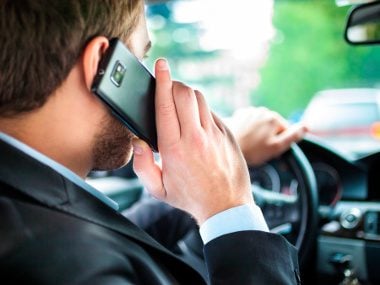
Talking on Hand-Held Cell Phones
Put the phone down: Talking on your cell phone while you’re driving is a tickeable offence. Officers can even charge a commuter $172 even for holding a cell phone while it’s powered off. Turn your phone off or leave it in a bag or glovebox so it doesn’t grab your attention when you’re on the road. If you must use your phone, your best bet is to pull over to the side of the road when it’s safe to do so. Using the hands-free option is legally allowed, though it’s considered an offence to fiddle with it when you’re driving.

Texting or Emailing
Christine Way with the Alberta Ministry of Transportation says the rule is simple: When you’re driving, you’re legally required to keep your eyes on the road. “Even a short text message or email can take those drivers’ eyes off the road for five seconds,” she says. “That’s enough time to travel the length of a football field.” So, if you desperately need to text or e-mail, pull over or get it out of the way before you head to your destination.
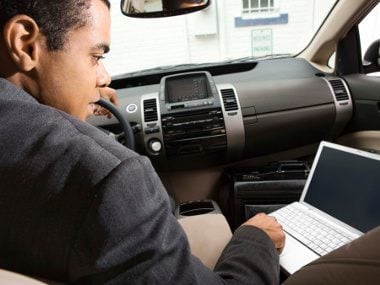
Using Electronic Devices
Earlier this spring, in the middle of a snowstorm, law enforcement in rural Alberta pulled a man over who was speeding and watching a TV show on his laptop. He learned the hard way that you don’t bring your computer to the wheel. Using laptop computers, video games, cameras, video entertainment displays and programming portable audio players (like MP3s) is strictly prohibited while driving.
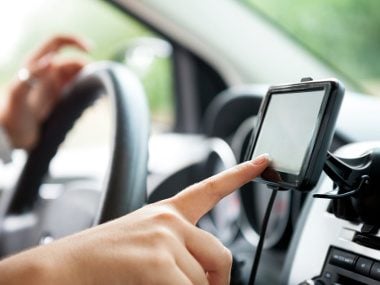
Manually Entering Information on GPS Units
If you’re using your GPS to help get you from A to B, it’s recommended you program the information before you head out. If you need to change your route, pull over to do so. “It takes your eye off the road and that’s when accidents happen,” says Way. The same goes for road navigation apps like Google Maps or Wavez on smartphone devices. If you’re stopped at a traffic light, fidgeting with your GPS it still considered to be distracted driving. Even if your driving isn’t affected, it’s still an offense.
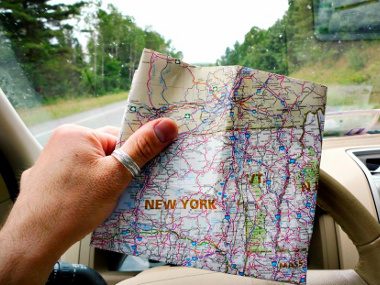
Reading Printed Material Like a Book or a Magazine
Considering how many drivers have been ticketed for this offence, it seems like reading the morning paper while on the commute to work is a bad habit Albertans need to break. Books, magazines and maps are also covered under this offence, so long as the vehicle is in motion. It’s just as dangerous as talking on the phone. Between October 2012 and October 2013, there’s been 27,000 distracted driving convictions in Alberta.
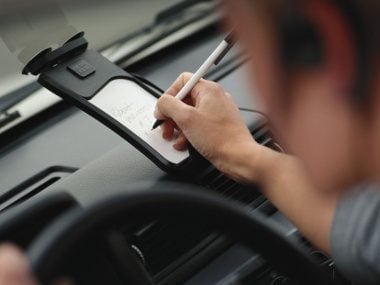
Writing, Printing or Sketching
Keep your pens, papers and prose away from the steering wheel. If you want to explore your creativity, the driver’s seat is not the place to do it. Way says writing, printing and sketching while driving aren’t necessarily common occurrences on Alberta roads, but they wanted to be extra cautious. “When we created this legislation we wanted it to be really comprehensive and encompass everything that could conceivably take the driver’s attention from the road,” she says.
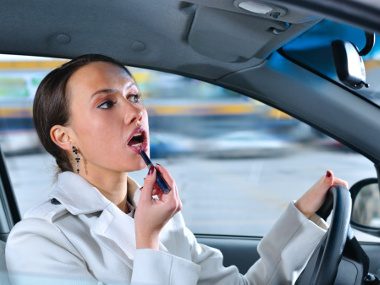
Personal Grooming
Allow yourself extra time before you head out in the morning so you don’t resort to treating your vehicle like a vanity. Combing your hair, applying makeup, flossing and brushing your teeth and shaving while driving are all ticketable offences. These are highly dangerous habits to get into and not something that should be part of your morning commute- or any other time. “For us, it’s about changing behaviours and attitudes,” says Way.
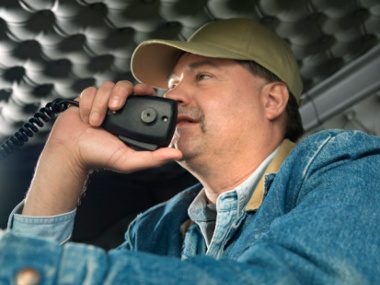
Using a Two-Way Radio
Using a two-way radio while driving is a ticketable offence. These gadgets, which attach to your dash and use a frequency, are common amongst some drivers in rural Alberta. It’s worth noting that police officers, emergency responders and professional drivers like taxi drivers are exempt from this legislation. Currently, distracted drivers are given a fine but not deducted demerit points, though that’s something the Ministry of Transportation plans to consider in the future.
For more information, visit the Alberta Motor Association’s website.